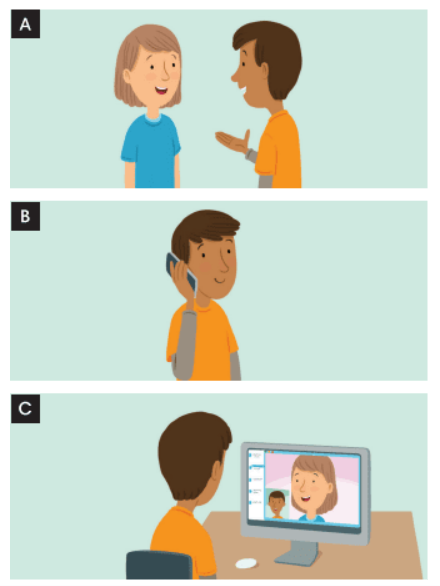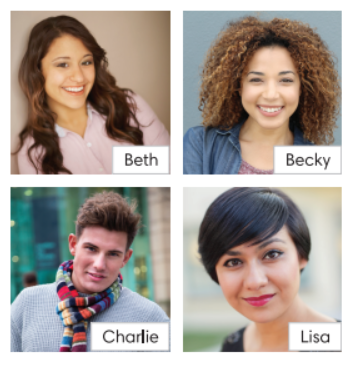3. Listen to an interview. Match the speakers (1-4) with the questions they are answering (a-h).
(Nghe một cuộc phỏng vấn. Nối người nói (1-4) với câu hỏi họ đang trả lời (a-h).)
|
1. Beth 2. Becky 3. Charlie 4. Lisa |
a. Where did you meet your first best friend? b. Did you live near him or her? c. Were your hobbies and interests the same? d. Did you like the same music? e. What toys did you like? f. Did you like the same food? g. Did you dress in a similar way? h. Is he or she still your best friend today? |
Bài nghe:
1. Beth: Eva was a really pretty girl in my class at primary school. Everyone wanted to be her friend. But she chose me to be her best friend! I was so happy, but then I got better marks than her in some tests and she chose another best friend. We weren't really good friends. She liked sports and I liked books.
2. Becky: Yes, best friends at five years old and best friends today. We liked different singers and bands then and today! Gwen was a big pop fan - she loved Mika! But I preferred rock, like my dad's old Queen tracks. Oh it was terrible - Gwen played Mika tracks again and again!
3. Charlie: Ben’s family had the house next to ours when we were in Manchester. We were always together. We looked like brothers! We had the same red T-shirts and caps, the same trainers ... We were really good friends.
4. Lisa: We both really liked boys’ things, not girls'. So we didn’t play with dolls, but we had lots of small cars and we spent a lot of time racing them round the bedroom! My young brother had a small garage. He never played with it because we did! One thing I remember was Tina's mum always made us cheese sandwiches. Tina loved cheese but I hated it! But I didn't tell her. I always put the cheese in my pocket!
Tạm dịch bài nghe:
1. Beth: Eva là một cô gái thực sự xinh đẹp trong lớp của tôi ở trường tiểu học. Mọi người đều muốn trở thành bạn của cô ấy. Nhưng cô ấy đã chọn tôi làm bạn thân của cô ấy! Tôi rất vui, nhưng sau đó tôi đạt điểm cao hơn cô ấy trong một số bài kiểm tra và cô ấy đã chọn một người bạn thân khác. Chúng tôi không thực sự là bạn tốt. Cô ấy thích thể thao và tôi thích sách.
2. Becky: Vâng, những người bạn thân nhất lúc năm tuổi và những người bạn tốt nhất hiện nay. Chúng tôi thích các ca sĩ và ban nhạc khác nhau vào thời điểm đó và ngày nay! Gwen là một fan hâm mộ nhạc pop lớn - cô ấy yêu Mika! Nhưng tôi thích rock hơn, giống như những bản nhạc Queen cũ của bố tôi. Ôi thật là khủng khiếp - Gwen đã chơi đi chơi lại các bản nhạc của Mika!
3. Charlie: Gia đình của Ben có ngôi nhà bên cạnh ngôi nhà của chúng tôi khi chúng tôi ở Manchester. Chúng tôi luôn ở bên nhau. Chúng tôi trông như anh em! Chúng tôi đã mặc áo phông và mũ lưỡi trai màu đỏ giống nhau, cùng một huấn luyện viên ... Chúng tôi thực sự là những người bạn tốt của nhau.
4. Lisa: Cả hai chúng tôi đều thực sự thích những thứ của con trai, không phải con gái. Vì vậy, chúng tôi không chơi với búp bê, nhưng chúng tôi có rất nhiều ô tô nhỏ và chúng tôi đã dành rất nhiều thời gian để đua chúng quanh phòng ngủ! Em trai tôi có một ga ra nhỏ. Cậu ấy không bao giờ chơi với nó bởi vì chúng tôi đã chơi! Một điều tôi nhớ là mẹ của Tina luôn làm cho chúng tôi bánh mì kẹp pho mát. Tina thích phô mai nhưng tôi ghét nó! Nhưng tôi đã không nói với cô ấy. Tôi luôn luôn để pho mát trong túi của tôi!
1. Beth - a, c
a. Where did you meet your first best friend?
(Bạn đã gặp người bạn thân đầu tiên của mình ở đâu?)
c. Were your hobbies and interests the same?
(Sở thích và đam mê của các bạn có giống nhau không?)
2. Becky - h, d
h. Is he or she still your best friend today?
(Nay anh ấy hay cô ấy có còn là bạn thân của bạn không?)
d. Did you like the same music?
(Các bạn có thích thể loại nhạc giống nhau không?)
3. Charlie - b, g
b. Did you live near him or her?
(Bạn có sống gần anh ấy hay cô ấy không?)
g. Did you dress in a similar way?
(Các bạn ăn mặc theo cách tương tự nhau không?)
4. Lisa - e, f
e. What toys did you like?
(Các bạn thích đồ chơi gì?)
f. Did you like the same food?
(Các bạn có thích những món ăn giống nhau không?)

Các bài tập cùng chuyên đề
3. Listen to the radio programme from 4Teen News. Then fill the blanks with the words you hear.
(Nghe chương trình radio từ 4Teen News. Sau đó điền những từ bạn nghe được vào chỗ trống.)
Speaker: Today we asked our friends: Tom from Australia, Linh from Viet Nam and Nobita from Japan to tell us about their robots. Tom, would you like to start?
Tom: Well my robot can (1) __________ what i say. It can also understand my feelings. It's the (2) __________ robot
Speaker: Linh?
Linh: My robot is my best friend. It does a lot for me: clean the floor, (3) __________ my toys away, and
Speaker: And Nobita?
Nobita: My robot is very useful. It helps me a lot. It can (4) __________ my plants and even work as a (5) __________
Listening
1. Listen to the conversation between Khang and Dr Adams and tick the phrases you hear.
(Hãy nghe đoạn hội thoại giữa Khang và Dr Adams và đánh dấu vào những cụm từ bạn nghe được.)
|
look after sick people (chăm sóc người ốm) |
|
|
understand what we say (hiểu những gì chúng tôi nói) |
|
|
build the very high buildings (xây dựng những tòa nhà rất cao) |
|
|
teach many subjects (dạy nhiều môn học) |
|
|
move heavy things (di chuyển những thứ nặng) |
|
2. Listen to the conversation again and tick (✓ ) T (True) or F (False).
(Nghe lại đoạn hội thoại và đánh dấu (✓ ) T (Đúng) hoặc F (Sai).)
|
|
T |
F |
|
1. Robots can't do many things today. |
|
|
|
2. Worker robots can build very high buildings. |
|
|
|
3. Teacher robots can teach on the internet. |
|
|
|
4. Robots can talk to humans. |
|
|
|
5. Robots can do everything like humans. |
|
|
1. In pairs, look at the picture above. What’s strange about it? Read the comments and check.
(Theo cặp, các em hãy nhìn bức ảnh trên và nói xem có gì bất thường? Đọc các bình luận và kiểm tra đáp án của mình.)
2. Listen and match the speaker (1-3) with the questions they are answering (a-f). There are two questions for each speaker.
(Nghe và ghép người nói (1-3) với những câu hỏi mà họ đang trả lời (a-f). Có hai câu hỏi cho từng người nói.)
a. Who was your idol when you were seven or eight?
b. Did you have a favourite singer or group when you were little?
c. Which cartoons did you like?
d. What was your first phone like?
e. What toys did you like best?
f. Do you remember any fashion from when you were younger?
3. Listen again and write down the speakers’ answers to the question in Exercise 2.
(Nghe lại lần nữa và viết câu trả lời của người nói trong bài tập 2)
2. Listen to Part 2 of the conversation above. Tick the things Max and Eva do with their smartphone.
(Nghe đoạn hội thoại 2. Đánh dấu vào những thứ mà Max và Eva đã làm với điện thoại của họ.)
1. _______ phone the police
2. _______ phone for an ambulance
3. _______ take a selfie with a police officer
4. _______ take a photo of the car
5. _______ check where they are on a map
4. Listen again. Choose the correct option.
(Nghe lại. Chọn phương án đúng.)
1. Beth and Eva met at primary / secondary school.
2. They had the same / different interests.
3. Gwen and Becky are no longer / still friends.
4. They liked / didn't like the same music.
5. Ben and Charlie lived / didn't live next to each other.
6. They wore different / similar clothes.
7. Lisa and Tina liked boys'/ girls' toys.
8. They liked the same / different food.
3. Listen. What sort of conversation are Beth and Lenny having? Choose the correct answer.
(Nghe. Beth và Lenny đang trò chuyện kiểu gì? Chọn câu trả lời đúng.)

4. Listen again. Choose the correct answer.
(Nghe một lần nữa. Chọn câu trả lời đúng.)
1. At the moment Beth is
a. in her room.
b. in another room in her house.
c. in the garden.
2. Beth is there because
a. her computer is rubbish.
b. her brother's room is nicer.
c. there's bad wi-fi signal in other rooms.
3. For his birthday Lenny got a new
a. tablet.
b. camera.
c. smartphone.
4. Owen wants to
a. go to bed.
b. look at some pictures.
c. play some music.
5. Lenny agrees to
a. call Beth back.
b. give Owen some help.
c. help Beth with her guitar lesson.
Fill in the blanks with only one word.








Danh sách bình luận